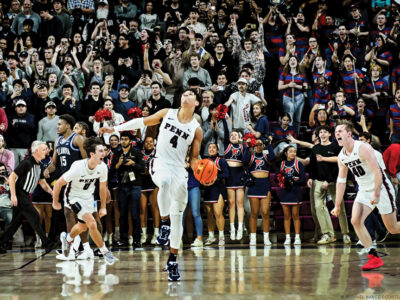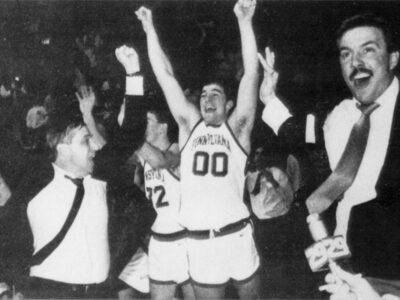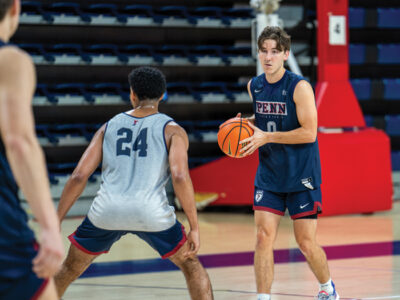By David Porter
Fairly or not, lasting perceptions are often formed out of fleeting moments. In Glen Miller’s case, one of those moments occurred on February 15, 2003, at the Palestra after his Brown team had completed a second-half meltdown against Penn and lost a rare chance to take control of the Ivy League basketball race.
In the rabbit warren that passes for a press room in the ancient arena, Miller made the not-so-veiled charge that Penn’s (and, for that matter, Princeton’s) decades-long dominance of Ivy League basketball extended to the refereeing crews, who, he claimed, were disinclined to make tough calls against those teams at crucial moments.
It came across as sour grapes at best; many viewed it as a serious breach of coaching etiquette. If nothing else, it reinforced the perception of Ivy League basketball as a two-tiered system in which the six schools not named Penn or Princeton sit at the children’s table and fight for the scraps discarded by the grownups. It also colored Quaker fans’ view of the bespectacled Miller, whose intensity and animated sideline style had already earned him their wrath on previous occasions.
Now, Miller is Penn basketball, having been named in late April to replace Fran Dunphy as the 17th head coach in the school’s illustrious 109-year basketball history. One of the first things he did was to clarify a few things to his new players.
“If you spend a little time with each other, you look at it in a totally different light than when you’re competing against someone,” Miller said recently in between house-hunting in the Philadelphia suburbs for his wife and four children. “I told the guys, when you’re at Brown, and Penn and Princeton have dominated this league for the last 44 years or whatever it is, and you really want to win a championship and build a program and overcome that dominance, you’ve got to teach the players to fight for every inch of the floor and gain some respect. Sometimes that comes out with the officiating when you come so close. And that was probably what that night was all about.”
At Brown, Miller took a team that had won eight games in 1999-2000 and nearly doubled that number in his first season, then set a school record with 17 wins the next season and equaled that mark twice more. His 2002-2003 team featuring Earl Hunt and Joseph Forte finished 17-12 and earned an NIT bid but fell short in its bid to break the Penn-Princeton stranglehold on the Ivy championship despite going 12-2 in the league.
Miller was frank in describing the challenge of coaching at one of the league’s second-tier schools, where overcoming lowered expectations is often the biggest obstacle.
“Over the years it seems to me that there were always schools that go through cycles,” he said. “Dartmouth one year would come close and then fall back, or Brown or whoever. And I think it’s easy to accept it and settle for third or fourth place, and I always made sure that we weren’t the program that was doing that. And that takes a lot of time and encouragement and discipline and determination from the coaching staff, and you have to instill that in the players and develop a deep pride in the program. That came out in my personality when we were playing Penn or Princeton, whether it was with the officials or whoever. That’s part of the reason we did make progress and we did knock on the door for a championship.”
Succeeding Dunphy and his 10 Ivy titles and five undefeated Ivy seasons presents a different set of challenges for Miller, who demonstrated his skill at rebuilding a program even before he arrived in Providence when he took Connecticut College to the Division III national semifinals in 1999. He sounded undaunted by the prospect of coaching at a school where two years without a championship is considered a drought.
“You can’t worry about that,” he said. “This is a great opportunity. This is on a higher level than any job I’ve had, and I’m embracing the challenge and the expectation level that goes along with it. I enjoy coaching; it’s been my life and my profession, and you just do the best you can do, you work hard, you coach with passion and I think that will be good enough to bring continued success to this program. I’m very confident of that.”
After Penn’s most successful men’s lacrosse season since 1988, Brian Voelker conceded that he was pleasantly surprised at his team’s play early in what turned into a magical spring.
“I looked at the early part of the schedule and thought if we could survive and maybe go 4-2 in our first six games, we’d have a chance to really get it going,” he said. “Then all of a sudden we’re 3-0, then 4-0, then 5-0.”
The Quakers wound up winning their first six games—one of them a 13-4 clobbering of North Carolina in Chapel Hill—and 10 of 13, and cruised into the NCAA Tournament for the second time in three years before falling to defending champion Johns Hopkins in the first round. It all came on the heels of a lackluster 2-11 season a year ago that featured a startling seven losses by three goals or fewer.
“As a coaching staff we were really disappointed in the year we had, and all players we had returning were disappointed,” said Voelker. “But I think it really helped us this year—not that I ever want to go through it again—but it got us focused, and this year we kind of turned it around and won a lot of close games. I was very happy with our effort.”
The post-season honor roll reflected the Quakers’ successes: defender Andrew Blechman, a senior, was second-team all-Ivy, attackman D.J. Andrzejewski (senior) and midfielders Alan Eberstein (senior) and David Cornbrooks (junior) received honorable mention, and Andrzejewski and Blechman were named to the honorable mention All-America team by the U.S. Intercollegiate Lacrosse Association.
David Porter C’82 writes for the Associated Press.




